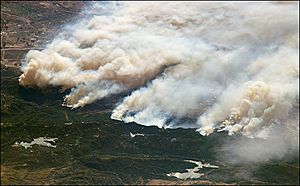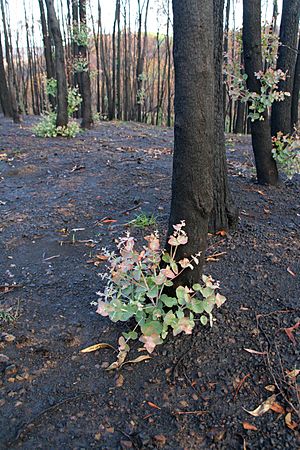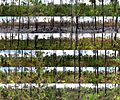Fire ecology facts for kids

Fire ecology is the study of how fire affects nature. It looks at what happens to ecosystems when fires occur. It also studies what causes these fires.
In many natural places, fire actually helps keep the habitat healthy. Think of places like the North American prairie or the South African savanna. In these areas, fire helps the land become new again. Many plants and trees there have adapted to fire. They might even need fire to grow well. Some even need fire for their seeds to sprout.
Contents
Why is Fire Important for Nature?
If fires are always stopped, dry wood and dead plants can build up. Bushes and trees that catch fire easily also start to grow. When these areas finally do catch fire, the wildfire can become much bigger. It can also be more damaging and harder to control.
In the United States, many people used to think that wildfires were always bad. This idea came from an old belief. People thought nature always grew towards a perfect, stable system. They believed that things like fires stopped this and destroyed nature's balance.
But we have learned that in some areas, fire is needed. It helps the natural system work correctly. Fire also helps the biodiversity of many habitats. This means it helps many different kinds of plants and animals live there. The plants and animals in these places have learned to protect themselves from fire. Sometimes, they even need fire to survive.
What are Controlled Burns?
Even though fire can be good for nature, it can still harm people. It can also burn down buildings. So, people now sometimes do "controlled burns". These are fires that are carefully started and managed. They let fire happen where it is needed. But they stop it from going where it could hurt people or their homes. This way, nature gets the fire it needs, and people stay safe.
Related pages
Images for kids
-
Wildfires started by lightning are common in the grasslands of Nevada.
See also
 In Spanish: Ecología del fuego para niños
In Spanish: Ecología del fuego para niños
 | Jackie Robinson |
 | Jack Johnson |
 | Althea Gibson |
 | Arthur Ashe |
 | Muhammad Ali |












